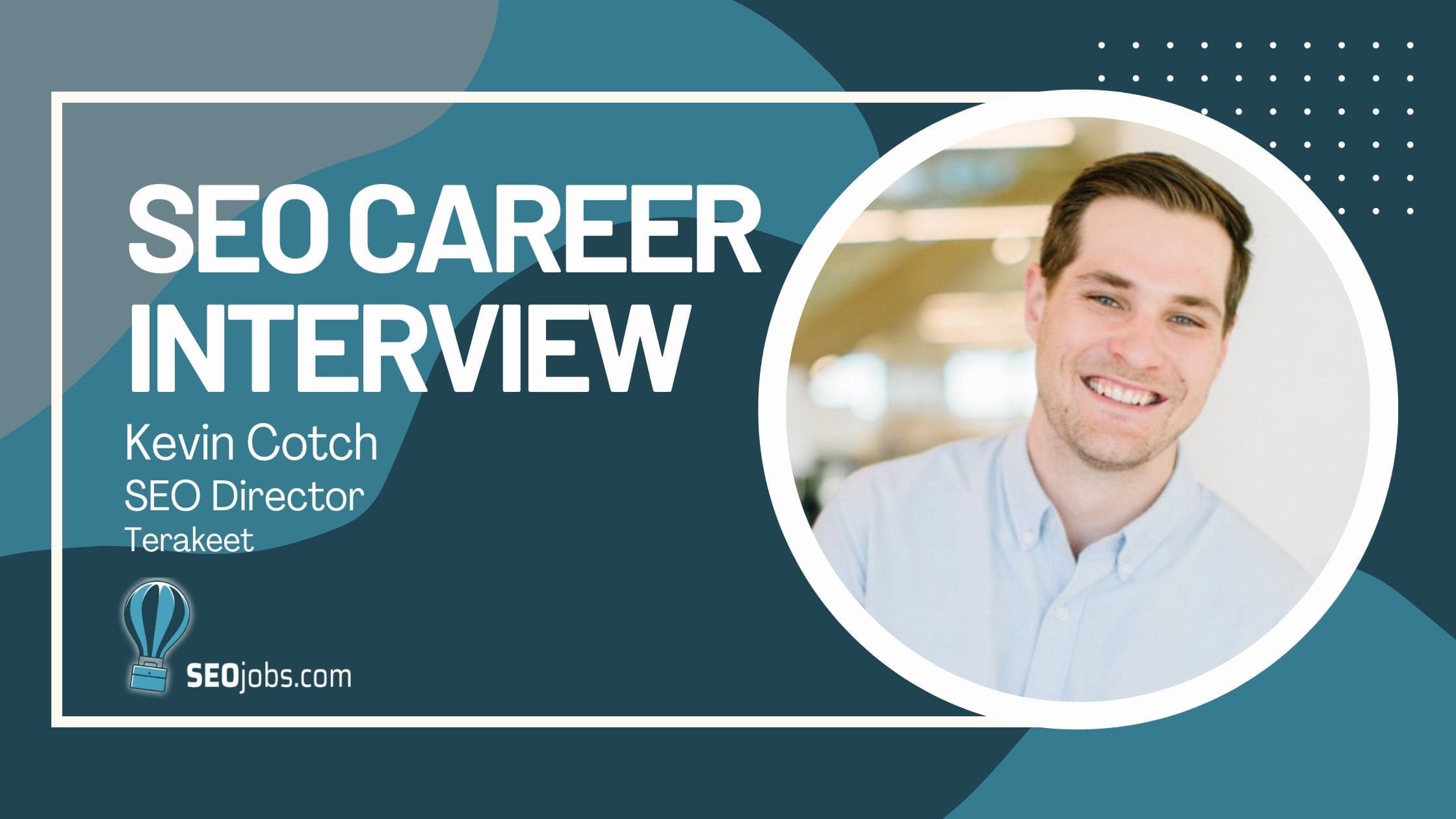Welcome to the SEO Careers interview series. This week, we’re excited to welcome Kevin Cotch, SEO Director at Terakeet, which is a leading enterprise organic search technology company based in Syracuse, NY. Kevin has over 10 years experience in SEO, and can be found on LinkedIn here.
If you are interested in being featured in the SEO careers interview series, please submit your name and contact details on our contact page.
Let’s jump in to this week’s interview!
Hi! We’re so glad to feature you on SEOjobs.com. Please introduce yourself to our site’s readers.
My name is Kevin Cotch. I live outside of Minneapolis, Minnesota and have been in the SEO industry for over 10 years.
Please share with us your current SEO role and for what company you work for.
I currently work as a SEO Director at Terakeet, a Syracuse, New York based organization that focuses on driving online revenue, increasing market share, and improving/maintaining brand reputation for Fortune 500 brands and executives. I’ve been working at Terakeet for just over five months.
As a SEO Director, my primary responsibilities is to create the SEO strategy for customers, support internal and external collaboration, and ultimately drive growth. I enjoy being able to partner with so many people and teams to execute an enterprise SEO strategy that drives actual business impact.
Can you share with us how you entered the SEO industry?
I went to college at the University of Minnesota with the intention to become a Biomedical Engineer. However, I quickly realized that was something I wasn’t passionate about. After trying to figure out what to focus on for a career, I landed on a program called Scientific and Technical Communications. That program focused on technical writing for four disciplines such as engineering, legal, medical, and new media. I initially thought that I would become a technical writer for the engineering discipline but the new media courses keep capturing my attention. I chose to have the new media discipline as my main focus with the thought that websites were becoming a more important part of our society. That program taught me writing skills, design and usability factors, and presentation skills – all skills I still use today.
Within that new media discipline, most of my courses were about usability factors. Learning about the usability factors was something that I became passionate about. I was able to work as an assistant in the University’s Usability Studies department, helping with usability studies and eye tracking tasks. I loved learning how people interacted with websites and started to think about how to get people to websites in the first place.
The summer before my senior year of college, I was able to land an internship at FindLaw. This internship was where I really learned the base of my SEO knowledge from an amazing team including Andre Johnson, Joe Wilebski, Jonathan Wilson, Nicole Lexvold, Alision Anderson, Dan Rasmussen, and Nick LeRoy to name a few. One of the team members that taught me the most was Nick LeRoy. Nick taught me a lot about SEO from local to content strategy, and even black hat tactics to keep an eye out for what competitors were doing.
My internship lasted my entire senior year, and I was excited to receive a full time offer with FindLaw post graduation. I’m grateful that I started my career there as I learned a lot about a competitive industry and how to work with (sometimes) challenging clients. After about a year working full time in that role, I wanted to expand my skill set outside of the legal industry and decided to pursue an opportunity to move into the higher education space.
How did you start to learn SEO? What are you currently doing to keep up with the ever changing SEO industry?
My internship at FindLaw was my first experience learning the different techniques and types of optimizations. My internship program gave me experiences learning sub-disciplines within SEO which gave me a broad perspective. During that time, one of the best pieces of advice I received to learn SEO was to build and maintain my own website. By building my own website, I was able to try different things and test out strategies instead on client sites.
Besides working on my own site, I was utilizing Twitter to keep up-to-date on new algorithm updates and strategies from industry experts. It still amazes me how great the SEO industry is at sharing different findings and learnings. Being able to find credible sources for news on Twitter led me to reading trusted sites in the industry. I tried to carve out at least an hour a day reading new articles about different topics and tactics.
The last place that I leveraged to learn more about SEO was attending MnSearch meetups. MnSearch is a non-profit organization based in the Twin Cities that connects local digital marketers with each other each month – they also hold an amazing annual conference in June that always has a lineup of talented speakers. The monthly meetups gave me the opportunity to learn from others in the industry and hear what local companies/agencies were focusing on to drive value.
Currently, I try to keep my goal of reading as much as possible about the changes in the SEO industry on the trusted websites I used years ago. I do not use Twitter anymore, but LinkedIn still provides a platform for me to connect and follow experts that share useful information pertaining to my current role.
The last resource I use currently to stay on top of information is the following two newsletters. The first one is SEOForLunch and The SEO MBA from Tom Critchlow. The SEOForLunch newsletter is great to get quick snippets of what is going on as well as a quick “Nick’s take” that helps me know the importance of an update without needing to invest a ton of extra time into the topic. The SEO MBA newsletter is a great way to keep focusing on what matters most to large enterprises instead of just basic SEO metrics.
Can you share what factors are most important to you in an SEO career and why? When do you know it’s time for a new job? Do these same factors play a role?
The most important factor to me in my career is to continue to broaden my skill set each day. I work with a ton of talented and smart individuals, which energizes me to learn from them. SEO changes so much each year and learning new skills and opportunities is vital for success. I want the time to dig in to research and test new theories to provide the best work.
Additionally, taking on new responsibilities as I progress through my career creates the need for continuous coaching and development. I am the most fulfilled in my work when I have a manager that is devoted to helping me grow by providing constructive feedback and coaching.
Of course, still having a solid salary and benefits (e.g., insurance, PTO, etc.) are important but having the right culture of growth and development drives a lot of my happiness.
What recommendations would you give to someone who is looking to join the SEO industry and get their first full-time SEO position?
My biggest piece of advice is to not view SEO as just SEO. SEO touches so much more than just keywords and top-line traffic. Instead, think about what business value you are going to or want to provide. When I started in the industry, I mainly focused on ranking number one for certain keywords. That is part of the goal, but I should have focused on how to leverage the organic search channel as a performance marketing driver instead. Ranking highly for a keyword with a ton of search volume each month is cool and fun. However, creating a holistic strategy that impacts other channels positively and drives revenue directly back to the business is what matters. This will keep you out of focusing on tactics that don’t drive value, which wastes time and money.
Also, test everything. Every site is different, and you don’t always know what competitors are doing. Identify what is right for your target audience, create a sound strategy, and execute by partnering with the right teams.
Lastly, figure out how each team works as you may need to change communication styles with different teams (business analysts or developers need different inputs compared to final decision makers). Figuring out how to best communicate leads to execution and implementation. Executing on the strategy effectively goes a lot farther than what most people realize.

